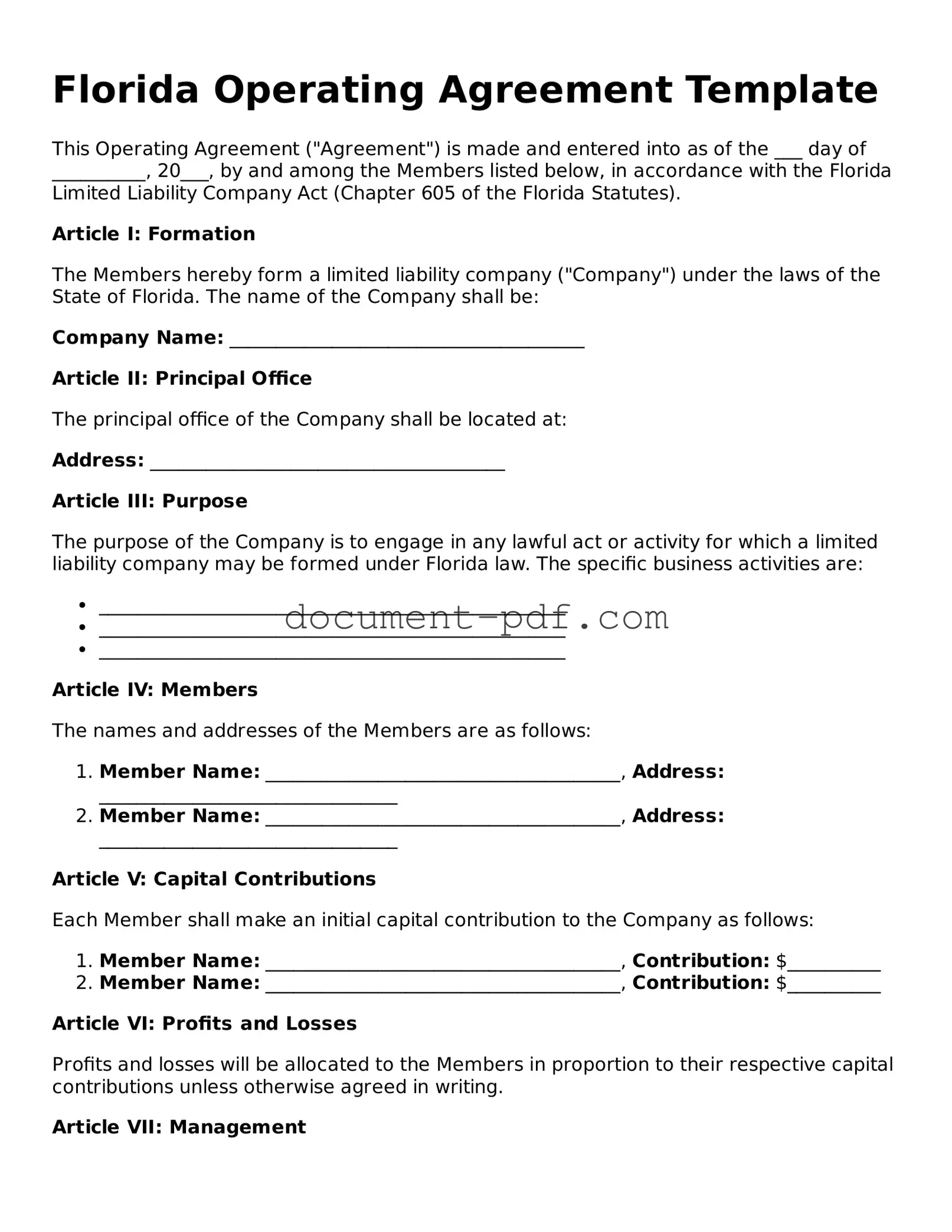The Florida Operating Agreement is similar to the Partnership Agreement. Both documents outline the rights and responsibilities of the parties involved in a business. A Partnership Agreement specifically addresses the relationship between partners in a partnership, detailing how profits and losses are shared, management duties, and the process for resolving disputes. This agreement ensures that all partners are on the same page regarding their roles and expectations, similar to how an Operating Agreement functions for members of a limited liability company (LLC).
Another document comparable to the Florida Operating Agreement is the Bylaws of a Corporation. While the Operating Agreement is tailored for LLCs, Bylaws serve a similar purpose for corporations. They establish the rules for how the corporation will be governed, including the roles of officers and directors, meeting protocols, and voting procedures. Both documents aim to provide a clear framework for management and decision-making within the organization.
The Shareholders Agreement also shares similarities with the Florida Operating Agreement. This document is used by corporations to outline the rights and obligations of shareholders. It often includes provisions on how shares can be sold or transferred, voting rights, and how disputes among shareholders will be handled. Like an Operating Agreement, it helps prevent misunderstandings and conflicts among stakeholders.
A Joint Venture Agreement is another document that resembles the Florida Operating Agreement. This agreement is created when two or more parties collaborate on a specific project or business activity. It outlines each party's contributions, responsibilities, and how profits or losses will be shared. Both agreements emphasize the importance of clarity in roles and expectations, which is crucial for the success of the venture.
The Limited Partnership Agreement is also akin to the Florida Operating Agreement. This document governs limited partnerships, where there are general partners who manage the business and limited partners who provide capital but have limited involvement in management. It details the rights and responsibilities of both types of partners, similar to how an Operating Agreement delineates the roles of members in an LLC.
The Membership Certificate is another related document. While it is not an agreement per se, it is often used in conjunction with the Operating Agreement. A Membership Certificate serves as proof of ownership in an LLC and may outline the member's rights, including voting rights and profit-sharing. This document complements the Operating Agreement by providing a tangible representation of membership status.
The Articles of Incorporation is another document that bears resemblance to the Florida Operating Agreement, although it serves a different purpose. This document is filed with the state to legally establish a corporation. It includes basic information such as the company name, purpose, and structure. While the Articles of Incorporation lays the foundation for a corporation, the Operating Agreement provides the operational framework for an LLC.
The Non-Disclosure Agreement (NDA) is also somewhat related. While its primary purpose is to protect confidential information, it can be relevant when forming an LLC. Members may use an NDA to ensure that sensitive business information shared among them remains confidential. This agreement supports the Operating Agreement by protecting the business's intellectual property and trade secrets.
The Employment Agreement is another document that can complement the Florida Operating Agreement. This agreement outlines the terms of employment for individuals working within the LLC. It typically covers job responsibilities, compensation, and termination conditions. While the Operating Agreement focuses on the relationship among members, the Employment Agreement addresses the relationship between the LLC and its employees.
The Texas Notice to Quit form is an essential document for landlords, serving as a formal notification to tenants that they must vacate the rental property. This important step in the eviction process provides tenants with critical information about the termination of their lease, clarifying the reasons behind the landlord's decision. For further details on this process and to access the required documentation, renters and landlords can refer to Texas PDF Templates, which offer convenient fillable forms to facilitate compliance with Texas rental laws.
Finally, the Loan Agreement can also be compared to the Florida Operating Agreement. If an LLC decides to borrow money, a Loan Agreement will specify the terms of the loan, including repayment schedules and interest rates. While the Operating Agreement outlines the management structure and member responsibilities, the Loan Agreement governs financial obligations and relationships with lenders.

